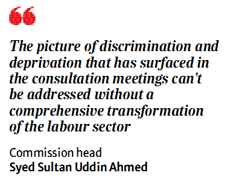Labour reform panel receives a dozen recommendations
Among them are recognition as workers, workers' database and registration system

Published :
Updated :

The Labour Reform Commission has so far received nearly a dozen key recommendations from over 50 consultation meetings, with common aspirations including formal recognition of workers, the development of a workers' database, and the launch of a registration system.
The commission formed by the interim government on November 18 last has been tasked with recommending required reforms to ensure workers' rights and welfare of the labour sector and submitting a report within 90 days that would end in February.

Most common aspirations extrapolated from consultations included elimination of inequality and discrimination in rights entitlement in the world of work, adequate protection for informal sector workers and developing national minimum wage and wage fixing parameters.
The meetings also recommended measures to ensure social protection including insurance and pension facility for workers, free and fearless environment for trade unions formation and practice and effective social dialogue.
Mostafizur Rahman, associate professor at Jagannath University, disclosed the common aspirations at a meeting held on Wednesday at Srama Bhaban in the city, presided over by the Commission's head Syed Sultan Uddin Ahmed.
Other common demands are to improve institutional efficiency, transparency and accountability of institutions like Department of Labour (DoL), Department of Inspection for Factories and Establishments (DIFE) and labour court, he said.
They emphaised effective system for dispute and grievance settlement, measures to bring required change in cultural and social norms and workers' skills, productivity and ensuring fair share.
The other common demands also included eliminating barriers to sustainable business and inclusive development, he noted.
Commission sources said they have already held more than 50 consultations with a number of trade unions, right organisations from different formal and informal sectors like readymade garment industry, domestic workers, sanitisation workers, sweeper from city corporation, outsourcing, medical representatives, ride sharing, light transportation, beauty parlour while institutions like DoL, DIFE, human/labour/women rights organisations, development partners like ILO, European Union representatives, multinational companies through their respective workers' organisation.
Talking to the FE, head of Labour Reform Commission Syed Sultan Uddin Ahmed said his commission has been working relentlessly to submit its recommendations within the stipulated time of February 18.
He said the commission has already exchanged views with the representatives of about 200 organisations and institutions.
"The picture of discrimination and deprivation that has surfaced during the consultation meetings can't be addressed without a comprehensive transformation of the labour sector," Mr Ahmed said adding that they are trying to make the recommendations considering those aspects of transformation.
Earlier on January 12, the Centre for Policy Dialogue (CPD) made a number of suggestions for short, mid and long term period that included developing a national minimum wage for all, incorporating children's education in the wage structure and introducing a wage-guarantee insurance scheme.
Regarding wage and its appropriate remunerations for the workers, the CPD suggested introducing a transparent and democratic procedure for selecting employers and workers' representatives on the wage board, mandatory alternative dispute- resolution mechanism and substantially raising the penalty for not paying minimum wage.
The other proposals included declaring the current calendar year as labour-reform year so that these reforms are expedited.
In the short term, the think-tank thinks minimum wages should be guaranteed for all types of contract-based workers, including those temporarily hired through third parties with legal provisions.
In the long term, all industries should be under the MWB coverage, prioritising sectors with a lower presence of trade unions.
Its other recommendations include introducing a new legal provision requiring an additional amount to pay for each day's delay in wage payment, substantially raising the penalty for not paying the minimum wage, especially deliberately, repeatedly.
Also, the CPD suggested making non-payment of overtime a punishable offence by law and brands/buyers accountable in complying with national rules and regulations, including those related to minimum wage and wage-related payments.
Oxfam in Bangladesh in its proposals on December 29 said marginalised workers in various informal sectors, especially domestic and home-based garment, tea plantation and fisherfolk, face severe challenges like lack of fair wages, social protection and basic workplace rights.
Domestic workers earn an average of Tk 5,311 monthly, far below their expenses worth Tk 10,801, home-based garment workers earn as little as Tk 0.50 per piece, with 71 per cent experiencing gender-based discrimination, tea plantation workers earn Tk 170 daily-the lowest globally-leaving 74 per cent below the poverty line with limited access to healthcare and education, according to Oxfam recommendations.
munni_fe@yahoo.com


 For all latest news, follow The Financial Express Google News channel.
For all latest news, follow The Financial Express Google News channel.